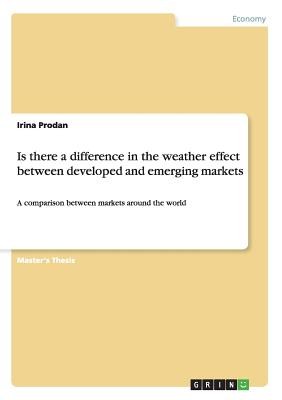
- We will send in 10–14 business days.
- Author: Irina Prodan
- Publisher: GRIN Publishing
- ISBN-10: 3656322473
- ISBN-13: 9783656322474
- Format: 14.8 x 21 x 0.3 cm, minkšti viršeliai
- Language: English
- SAVE -10% with code: EXTRA
Is there a difference in the weather effect between developed and emerging markets (e-book) (used book) | bookbook.eu
Reviews
Description
Master's Thesis from the year 2012 in the subject Economics - Other, grade: 1, VU University Amsterdam, language: English, abstract: One renowned and frequently researched anomaly over the last two decades is the weather effect - the impact of weather on stock market returns. The extensive literature on the weather effect fails to converge towards a unique, systematic and robust relationship between the weather and the stock market. Therefore, the aim of this paper is to explain the contradictory results in the literature by testing whether stock prices are affected by the weather in a significantly different manner depending on the level of market development and explaining how this difference behaves over time. In order to test for this, city-by-city, pooled and binary regressions are employed using data of 10 developed and 10 emerging countries over the period 1996-2011 by using two different means of seasonal adjustment. The results show that weather has a very small impact on the worldwide stock market returns and that the significance of the weather effect is decreasing over time with a cyclical pattern in terms of its recurrence. We identify the year 2001 as the cut-off point when the significance of weather on stock markets diminishes. No support has been found for a real difference in the weather effect between emerging and developed countries. However, evidence has been found of the relative inefficiency of the emerging markets and for the declining influence of weather in time.
EXTRA 10 % discount with code: EXTRA
The promotion ends in 21d.17:41:03
The discount code is valid when purchasing from 10 €. Discounts do not stack.
- Author: Irina Prodan
- Publisher: GRIN Publishing
- ISBN-10: 3656322473
- ISBN-13: 9783656322474
- Format: 14.8 x 21 x 0.3 cm, minkšti viršeliai
- Language: English English
Master's Thesis from the year 2012 in the subject Economics - Other, grade: 1, VU University Amsterdam, language: English, abstract: One renowned and frequently researched anomaly over the last two decades is the weather effect - the impact of weather on stock market returns. The extensive literature on the weather effect fails to converge towards a unique, systematic and robust relationship between the weather and the stock market. Therefore, the aim of this paper is to explain the contradictory results in the literature by testing whether stock prices are affected by the weather in a significantly different manner depending on the level of market development and explaining how this difference behaves over time. In order to test for this, city-by-city, pooled and binary regressions are employed using data of 10 developed and 10 emerging countries over the period 1996-2011 by using two different means of seasonal adjustment. The results show that weather has a very small impact on the worldwide stock market returns and that the significance of the weather effect is decreasing over time with a cyclical pattern in terms of its recurrence. We identify the year 2001 as the cut-off point when the significance of weather on stock markets diminishes. No support has been found for a real difference in the weather effect between emerging and developed countries. However, evidence has been found of the relative inefficiency of the emerging markets and for the declining influence of weather in time.


Reviews